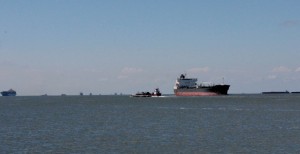Why a Tanker of Kurdish Oil is Stranded by the Galveston Coast
From KUT’s Texas Standard:
Tensions between the government of Iraq and Kurds in the northern part of the country have once again reached a boiling point. Now, Baghdad is cutting off payments to Kurdistan because of a controversy involving an oil tanker off the coast of Texas.
The semi-autonomous region of Kurdistan has successfully exported several shipments of oil this year. Baghdad opposed those exports, claiming that the oil belongs to the Iraqi people, and the use of its natural resources should be decided by the central government. Most recently, Baghdad successfully filed for a court order to keep one million barrels of crude oil from being unloaded in Galveston.
The Texas Standard’s David Brown recently spoke with Terry Wade, Houston Bureau Chief for Reuters, about how the tanker came to be there in the first place.
“[Kurdistan] wants to be able to independently export crude, because they need the money to finance their own ambitions to create an independent state,” Wade explains. “The U.S. position is that the oil belongs to all Iraqis, and Kurdish independence might be bad for Iraq as a whole.”
The oil is pumped from the fields around Kurdistan, shipped via a recently-built pipeline into Turkey, before being shipped out through the Mediterranean Sea.
“Besides the tanker that’s off the coast of Texas right now, there are at least two other tankers in the world carrying Kurdish crude that are also in a kind of state of limbo,” Wade says. “The oil could be bought by any number of refiners all over the world. There was another shipment of Kurdish oil that arrived in Texas in May. The buyer of that has still not been identified.”
In the court order, Baghdad asks U.S. Marshalls to seize and return the oil to the Iraqi people should it reach the Texas shore. But on Tuesday, Federal Magistrate Judge Nancy Johnson ruled that the tanker was too far offshore for court to have jurisdiction. Still, that could change if the tanker gets within 12 nautical miles of the shore.
“The state department made a point of discouraging companies from buying Kurdish oil because of potential legal risks, but at the same time it said it will not directly intervene in the impasse,” Wade says. “The boat is currently anchored offshore, and lawyers at a court hearing yesterday said it could potentially sail away if it wanted to, but so far that has not happened. It’s not clear yet if it will.”

